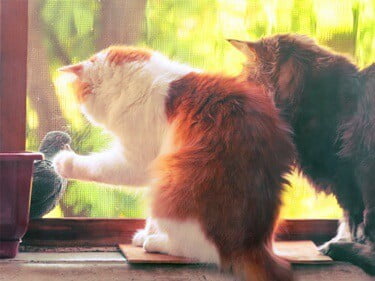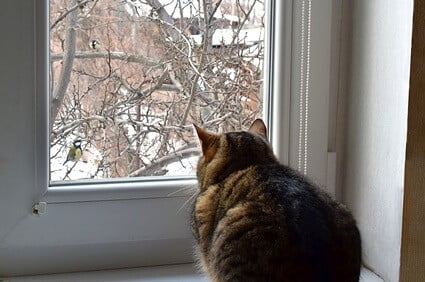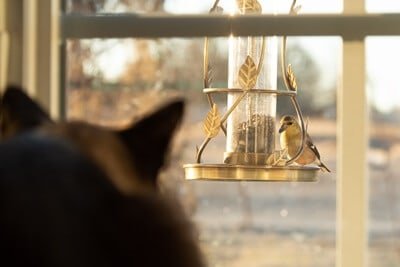Chirping isn’t a sound that you’d normally associate with cats. However, if you pay close attention when your cat is bird-watching, you may hear a slight chirping or chattering sound that isn’t coming from the birds. Instead, your cat seems to be the one imitating bird sounds.
Cats chirp at birds when happy, excited, or they want to mimic bird sounds. Also, cats make a similar sound, called chattering, when watching prey, because the thought of hunting excites them.
There’s a difference between chirping and chattering. Although they may sound the same, they convey different emotions. Being able to tell the difference may enable you to understand your cat better.
Why Does My Cat Chatter at Birds?
Cats often chatter and chirp when watching birds, primarily due to seeing prey animals.
Cats are natural hunters, and even though they have been our companions for around 10,000 years, they aren’t fully domesticated. Their behavior is still largely ruled by their natural instincts. Even if your cat has all the cat food in the world, the moment it sees a bird, instincts will tell it that it’s hunting time.
There is a difference between chattering and chirping. Chirping is produced by the cat’s throat muscles similarly to when it purrs. On the other hand, chattering can be described as the rapid vibration of the cat’s jaws that causes its teeth to clash.
Chirping is how some cats express their excitement at seeing birds. Chattering has to do with the way they kill their prey. When cats finally go for the kill, they try to get it over as fast as possible.
This reduces the chances of the prey escaping or fighting back. When they bite down on the prey’s neck, they vibrate their jaws to sever the animal’s spinal cord as quickly as possible.
Cats want to be as silent as possible when hunting so that they don’t alert their prey. Making any sound would be counterintuitive, so it makes sense that chattering while prey-watching is not something they can control.
Why Does My Cat Sound Like a Bird Chirping?
Many cat owners have noticed that cats don’t just chirp when focusing on potential prey. They also chirp when they’re feeling very happy or excited. This might sound strange since the only sounds we associate with domestic cats are purrs and meows.
However, cats are capable of producing a variety of different vocalizations. If you’ve ever heard cats fighting or calling for a mate, you’ll know just how diverse cat sounds can get when they want to express themselves vocally.
According to Lund University, cats can produce four different bird-like vocalizations just from watching birds. But what does it mean if your cat makes these sounds when it’s not looking at birds?
It’s theorized that chirping is one of the many ways a cat responds to excitement, regardless of whether or not it is watching prey.
Sometimes, your cat may chirp because it’s happy, in which case, you don’t have to do anything. Happy chirps happen while the cat is eating or being affectionate with you.
Besides, chirping means that your cat is charged with adrenaline and needs an intense play session. If you don’t help your cat direct all that energy into something productive, it may destroy things out of frustration.
Do Cats Get Frustrated Watching Birds?
Cats can sometimes get frustrated watching birds. Birds dare to exist where your cat can’t reach them, leaving your feline’s desire to hunt completely unfulfilled.
We know that cats have different ways of expressing themselves vocally, so it’s entirely possible that some cats chirp when watching birds because they’re frustrated.
To truly know if this is the situation for your cat, you can observe its behavior. If your cat displays aggression or destructive behavior after or during the bird-watching session, it’s feeling frustrated. The same can be said if it aggressively grooms itself, a common sign of stress and frustration in cats.
Pay attention to the kind of sounds your cat is making. Chirps are high-pitched and short. Cats chirp when happy or as an involuntary response to seeing birds or other prey. Chattering, however, is a sound made by the cat’s teeth. It is usually lower in pitch and sounds angrier than normal chirps.
If you notice that your cat is frustrated after watching birds, you need to play with it. Play games that are physically demanding and allow the cat to catch the toy frequently. This will help the cat blow off steam, decreasing the chances of aggressive behavior that stem from frustration.
You should also consider blocking off the window your cat uses to watch birds. While it’s important for cats to be able to see outside, if the sight of avian creatures only ever irritates your cat, take away its window privileges.

Cat Mimicking Bird
It’s possible that cats mimic birds to lure them into a false sense of security, making hunting easier.
It’s known that cats chirp when excited, frustrated, or as an involuntary response to seeing an animal they want to hunt. However, a lesser-known theory is that they want to trick the birds.
Mimicking is a special skill that few animals have. The most popular mimics in the animal kingdom are avian creatures, so it’s hard to imagine cats as part of that category.
However, according to Neotropical Primates, many wild cats, including cougars, jaguars, margays, and ocelots, have been recorded mimicking the sounds of the animals they hunt.
Of course, wild cats are different from domestic cats. Still, they belong to the same Felidae family, which all have the same basic vocal patterns, such as:
- Meowing
- Hissing
- Growling
According to Mammal Review, despite their domesticated status, their genotype and phenotype remain largely unchanged.
The University of Southampton explained that domestic cats freely breed with feral populations. These are known to breed with wild cats to the point where conservationists have difficulty distinguishing between pure wild cats from domestic cat breeds.
This means that the domestic cat’s current hunting abilities and techniques don’t stray too far from their wild cat ancestors.
Is It Normal for Cats to Chirp?
Chirping is completely normal behavior in cats. It’s one of the many ways that cats express themselves vocally. All cats are different, so not all of them will chirp, but they all can do so.
Even though chirping is normal cat behavior, you should still pay attention when your cat does it. Chattering is often confused with chirping. The latter usually means joy, while the former means that your cat wants to hunt.
Being unable to indulge in the desire to hunt often leaves cats frustrated, so it’s a good idea to play with your cat if it chatters while watching birds. If you notice that your cat is merely chirping without any signs of frustration, there’s no cause for concern.

Cat Chattering Jaw
The only time you should be worried about your cat chattering is when that’s the only sound it makes. It isn’t normal for a cat’s jaw to vibrate and its teeth to clash continuously.
A constantly chattering jaw could be a sign of:
- Oral lesions
- Cat cavities
- Throat disease
Besides the chattering, cats with an oral problem will:
- Stop eating
- Salivate excessively
- Bleed from the mouth
- Only eat from one side
- Drop food from their mouths
They’ll be reluctant to use their mouth while playing and may have trouble vocalizing. Oral problems in cats are extremely debilitating because of the pain and the effect they have on the cat’s ability to eat.
Unfortunately, they’re difficult to detect until they are severe. To keep your cat healthy, pay close attention if it makes strange chattering sounds often.

